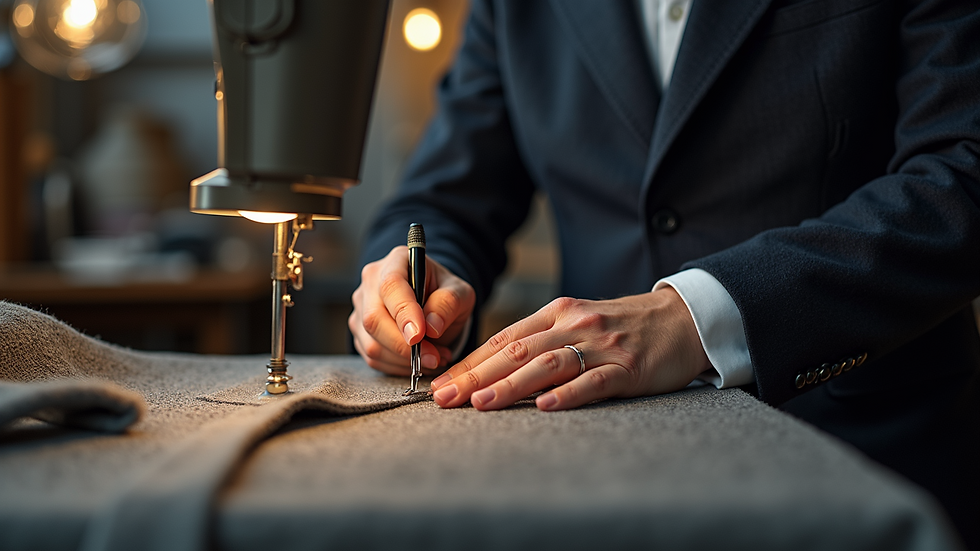How to Identify a Reliable Clothing Supplier
- cian783

- Jun 13
- 4 min read
Finding a reliable clothing supplier is essential for anyone looking to start or grow a clothing business. Whether you're a budding fashion designer or a seasoned retailer, your supplier's quality, reliability, and communication play a pivotal role in your success. This guide will walk you through the practical steps to identify a trustworthy clothing supplier who can meet your needs.
Understanding the Importance of a Clothing Supplier
A clothing supplier is not just a vendor; they are your business partner. A reliable supplier ensures that you receive high-quality materials, timely deliveries, and real support for any issues you may encounter. When you're sourcing materials for your brand, the supplier's reliability can determine the difference between a smoothly run operation and frustration that can jeopardize your sales.
A well-chosen supplier also helps you maintain your brand's reputation. If the clothing you sell doesn't meet customer expectations, it reflects poorly on your business. Therefore, the search for a trustworthy supplier must begin with a clear understanding of what you need, including fabric materials, price range, and order quantities.

Key Factors to Consider When Selecting a Clothing Supplier
Choosing the right clothing supplier involves evaluating various factors. Here are essential elements to look for:
1. Quality of Materials
The quality of materials is the first aspect to verify. Are the fabrics durable, comfortable, and easy to maintain? Look for suppliers who provide samples or swatches before placing a bulk order. You can also check reviews or ask for references from other clients to gauge their quality.
2. Production Capabilities
Different suppliers have varying production capabilities. It's crucial to know if they can handle your expected order size and timeframes. Some may specialize in small runs, whereas others can accommodate larger orders. Determine your requirements and ensure the supplier can scale up or down as needed.
3. Pricing Structure
Pricing is always a significant factor. Make a list of potential suppliers and compare their price points. However, be cautious—sometimes the cheapest option may compromise quality or service. Understand what influences their pricing—materials, labor, and shipping—and be prepared to pay a bit more for a retailer with a solid reputation.

Evaluating Supplier Credentials
Once you've narrowed down a few suppliers, it’s time to dig deeper into their credentials. This evaluation can help you uncover hidden issues or confirm their reliability.
1. Certifications and Compliance
Check if the supplier complies with industry regulations and standards. Certifications from reputable organizations signify that they adhere to ethical, environmental, and quality standards. For example, certifications like GOTS (Global Organic Textile Standard) or OEKO-TEX can assure you of sustainable practices.
2. Industry Experience
Experience in the clothing industry often correlates with reliability. A supplier who has been in business for several years is likely to understand the market better and respond effectively to challenges. Look for those with a proven track record of delivering quality products on time.
3. Communication
Effective communication is paramount. A reliable supplier should respond promptly to inquiries and provide clear and honest information. Test their responsiveness by asking questions about their products, business practices, or shipping times. Note how quickly they respond and whether they provide detailed answers.
The Importance of Payment and Terms
Another key aspect to consider is the payment terms and conditions. Contracts and agreements may vary among suppliers, so it’s essential to read the terms carefully.
1. Payment Options
Understand what payment methods the supplier accepts. Many suppliers offer various payment options, including credit terms, which can provide flexibility for your cash flow.
2. Lead Times and Shipping
Inquire about lead times on orders and shipping methods. Make sure to discuss the supplier's policies on delays and cancellations to avoid surprises later.
3. Return Policy
Last but not least, review their return policy on defective items. A reliable supplier should have a transparent return and replacement policy, ensuring you receive the quality you expect.

Building a Long-Lasting Relationship with Your Supplier
Once you have identified a reliable supplier, focus on building a strong relationship. A positive partnership will create room for better negotiations and collaboration in the future.
1. Open Communication
Maintain regular communication. Update them on your business needs, changes in order volume, or feedback about their products. This keeps the line of communication open and builds trust between both parties.
2. Seeking Feedback
Regularly provide feedback about the products and service you receive. Positive reinforcement will encourage them to maintain their standards, while constructive criticism allows for improvements.
3. Visit the Supplier's Facility
If possible, visiting your supplier’s facility can enhance your understanding of their operations. This firsthand experience allows you to see how they work and gives you additional confidence in their capabilities.
Taking the Next Steps
Identifying a reliable clothing supplier takes some time and effort, but it is worth it in the long run. Start with thorough research and ensure you are aligned on quality, pricing, and communication. Once you find that trusted source for your clothing needs, your business can flourish.
For additional support in sourcing a high-quality clothing supplier, consider engaging with industry experts who can guide you through the process. Remember, the supplier you choose today can shape your business's future.
Identifying a reliable clothing supplier may seem daunting, but with careful research and consideration of the factors discussed, you can make informed decisions that will benefit your business in the long term.







Comments